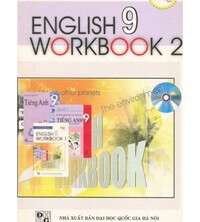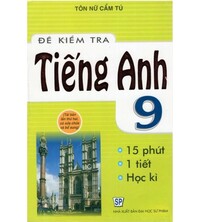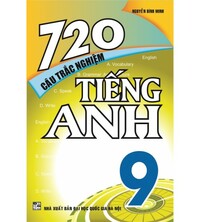Tiếng Anh 9 Unit 6 Looking back
1. Choose the correct answer A, B, C, or D to complete each sentence. 2. Complete the sentences with the correct forms of the words in brackets. 3. Circle the correct words or phrases to complete the following sentences. 4. Make complete sentences from the clues. Make any changes and add more words if necessary.
Bài 1
Vocabulary
1. Choose the correct answer A, B, C, or D to complete each sentence.
(Chọn đáp án đúng A, B, C hoặc D để hoàn thành mỗi câu.)
1. I love animals and I'm determined to ______ my dream of becoming a vet.
A. have
B. pursue
C. do
D. depend on
2. ______ people tend to put the needs of their families ahead of their own.
A. Independent
B. Democratic
C. Kind
D. Family-oriented
3. Rapid changes in society and lifestyle have made the ______ in many families wider.
A. generation gap
B. family relation
C. family values
D. experiences
4. She has found ______ sources of information about life in Viet Nam a century ago.
A. extended
B. alive
C. various
D. long
5. Like adults, children sometimes want some ______.
A. opportunity
B. relations
C. values
D. privacy
Lời giải chi tiết:
|
1. B |
2. D |
3. A |
4. C |
5. D |
1. B
I love animals and I'm determined to pursue my dream of becoming a vet.
(Tôi yêu động vật và quyết tâm theo đuổi ước mơ trở thành bác sĩ thú y.)
A. have (v): có
B. pursue (v): theo đuổi
C. do (v): làm
D. depend on (v): phụ thuộc vào
2. D
Family-oriented people tend to put the needs of their families ahead of their own.
(Những người hướng về gia đình có xu hướng đặt nhu cầu của gia đình lên trên nhu cầu của bản thân.)
A. Independent (adj): Độc lập
B. Democratic (adj): Dân chủ
C. Kind (adj): Tử tế
D. Family-oriented (adj): Hướng về gia đình
3. A
Rapid changes in society and lifestyle have made the generation gap in many families wider.
(Những thay đổi nhanh chóng trong xã hội và lối sống đã khiến khoảng cách thế hệ trong nhiều gia đình ngày càng rộng hơn.)
A. generation gap: khoảng cách thế hệ
B. family relation: quan hệ gia đình
C. family values: giá trị gia đình
D. experiences: trải nghiệm
4. C
She has found various sources of information about life in Viet Nam a century ago.
(Cô đã tìm được nhiều nguồn thông tin về cuộc sống ở Việt Nam cách đây một thế kỷ.)
A. extended (adj): mở rộng
B. alive (adj): sống
C. various (adj): đa dạng
D. long (adj): dài
5. D
Like adults, children sometimes want some privacy.
(Giống như người lớn, trẻ em đôi khi muốn có sự riêng tư.)
A. opportunity (n): cơ hội
B. relations (n): quan hệ
C. values (n): giá trị
D. privacy (n): quyền riêng tư
Bài 2
2. Complete the sentences with the correct forms of the words in brackets.
(Hoàn thành câu với dạng đúng của từ trong ngoặc.)
1. My parents taught me not to listen to other people's _______ conversations. (privacy)
2. It's amazing that the boy can _______ all the information in such a short time. (memory)
3. Living away from home to attend college has made me more _______. (independence)
4. In a modern society, we learn to value a person's _______. (free)
5. In a _______ classroom, every student has the right to speak as well as the responsibility to listen to others. (democracy)
Lời giải chi tiết:
|
1. private |
2. memorize |
3. independent |
|
4. freedom |
5. democratic |
|
1. private (adj): riêng tư
Vị trí còn trống cần một tính từ đứng trước và bổ nghĩa cho danh từ “conversations” phía sau (cấu trúc: “adj + N”) => điền tính từ “private”.
My parents taught me not to listen to other people's private conversations.
(Bố mẹ dạy tôi không được nghe chuyện riêng tư của người khác.)
2. memorize (v): ghi nhớ
Sau động từ khuyết thiếu “can” cần dùng một động từ nguyên mẫu (cấu trúc “S + can + V-inf”: ai đó có thể làm gì) => vị trí còn trống cần điền động từ “memorize”.
It's amazing that the boy can memorize all the information in such a short time.
(Thật ngạc nhiên khi cậu bé có thể ghi nhớ mọi thông tin trong thời gian ngắn như vậy.)
3. independent (adj): tự lập
Cấu trúc “make sb adj” (khiến ai đó thế nào). Phía trước chỗ trống có từ so sánh “more” => vị trí còn trống cần điền tính từ “independent”.
Living away from home to attend college has made me more independent.
(Việc sống xa nhà để học đại học đã khiến tôi tự lập hơn.)
4. freedom (n): sự tự do
Sau sở hữu cách ta dùng danh từ => vị trí còn trống cần điền danh từ “freedom”.
In a modern society, we learn to value a person's freedom.
(Trong xã hội hiện đại, chúng ta học cách trân trọng sự tự do của con người.)
5. democratic (adj): mang tính dân chủ
Vị trí còn trống cần một tính từ đứng trước và bổ nghĩa cho danh từ “classroom” phía sau (cấu trúc: “adj + N”) => điền tính từ “democratic”.
In a democratic classroom, every student has the right to speak as well as the responsibility to listen to others.
(Trong một lớp học dân chủ, mọi học sinh đều có quyền phát biểu cũng như có trách nhiệm lắng nghe người khác.)
Bài 3
Grammar
3. Circle the correct words or phrases to complete the following sentences.
(Khoanh tròn những từ hoặc cụm từ đúng để hoàn thành những câu sau.)
1. Do you mind turning / to turn the volume down? I'm studying.
2. We decided spending / to spend this whole week learning to cook traditional foods.
3. If you want seeing / to see the differences between the past and the present of a city, visit its museum.
4. He stayed in his room to avoid meeting / to meet his parents' guests.
5. My brother promised taking / to take me to the exhibition of traditional farming tools.
Lời giải chi tiết:
|
1. turning |
2. to spend |
3. to see |
|
4. meeting |
5. to take |
|
1. mind + V-ing: bận tâm, phiền lòng làm gì
Do you mind turning the volume down? I'm studying.
(Bạn có phiền giảm âm lượng xuống không? Tôi đang học.)
2. decide + to V: quyết định làm gì
We decided to spend this whole week learning to cook traditional foods.
(Chúng tôi quyết định dành cả tuần này để học nấu các món ăn truyền thống.)
3. want +to V: muốn làm gì
If you want to see the differences between the past and the present of a city, visit its museum.
(Nếu bạn muốn thấy sự khác biệt giữa quá khứ và hiện tại của một thành phố, hãy ghé thăm bảo tàng của thành phố đó.)
4. avoid + V-ing: tránh làm gì
He stayed in his room to avoid meeting his parents' guests.
(Anh ở trong phòng để tránh gặp khách của bố mẹ.)
5. promise + to V: hứa làm gì
My brother promised to take me to the exhibition of traditional farming tools.
(Anh tôi hứa sẽ đưa tôi đi xem triển lãm nông cụ truyền thống.)
Bài 4
4. Make complete sentences from the clues. Make any changes and add more words if necessary.
(Viết câu hoàn chỉnh từ gợi ý. Thực hiện bất kỳ thay đổi nào và thêm nhiều từ hơn nếu cần thiết.)
1. we / plan / visit / historical places / Cao Bang.
2. we / hope / have / bus station / near / village / soon.
3. even / grandmother /enjoy / use / Facebook / communicate / her friends.
4. last year / I / learn / make cakes / watch / cooking videos / Internet.
5. this morning / I / suggest / do a survey / northern women's traditional costumes.
Lời giải chi tiết:
1. We plan to visit historical places in Cao Bang.
(Chúng tôi dự định đi thăm những địa điểm lịch sử ở Cao Bằng.)
Giải thích:
Câu miêu tả sự việc ở hiện tại nên dùng thì hiện tại đơn => we + V (nguyên thể)
plan + to V: dự định làm việc gì => plan to visit
in + địa điểm (tỉnh/ thành phố) => in Cao Bang
2. We hope to have a bus station near our village soon.
(Chúng tôi hy vọng sẽ sớm có một trạm xe buýt gần làng của chúng tôi.)
Giải thích:
Câu miêu tả sự việc ở hiện tại nên dùng thì hiện tại đơn => we + V (nguyên thể)
hope + to V: hi vọng việc gì => hope to have
a + danh từ số ít trong câu miêu tả => a bus station: một trạm xe buýt
chủ ngữ “we” nên dùng tính từ sở hữu trước danh từ phía sau để xác định sự vật => our village: làng của chúng tôi
3. Even my grandmother enjoys using Facebook to communicate with her friends.
(Ngay cả bà tôi cũng thích sử dụng Facebook để liên lạc với bạn bè.)
Giải thích:
Trước danh từ số ít “grandmother” cần dùng tính từ sở hữu để xác định => my grandmother: bà của tôi
Câu miêu tả sự việc ở hiện tại nên dùng thì hiện tại đơn => chủ ngữ số ít + V-s/es => enjoys
enjoy +V-ing: thích làm việc gì => enjoys using
Cấu trúc chỉ mục đích “to V” (để mà) => to communicate: để giao tiếp
Cụm từ: communicate with someone (giao tiếp với ai)
4. Last year, I learned to make cakes by watching cooking videos on the Internet.
(Năm ngoái, tôi học làm bánh bằng cách xem video nấu ăn trên Internet.)
Giải thích:
Trong câu có “last year” nên dùng thì quá khứ đơn: Ved/V2 => I learned
learn + to V: học cách làm gì => learn to make cakes: học làm bánh
by + V-ing: bằng cách gì => by watching: bằng cách xem
Cụm từ: on the Internet (trên mạng)
5. This morning, I suggested doing a survey on northern women's traditional costumes.
(Sáng nay tôi đề nghị làm một cuộc khảo sát về trang phục truyền thống của phụ nữ miền Bắc.)
Giải thích:
Trong câu có “this morning” nên dùng thì quá khứ đơn: Ved/V2 => I suggested
suggest + V-ing: đề nghị làm việc gì => suggested doing
a survey on + N: khảo sát về cái gì
Search google: "từ khóa + timdapan.com" Ví dụ: "Tiếng Anh 9 Unit 6 Looking back timdapan.com"







